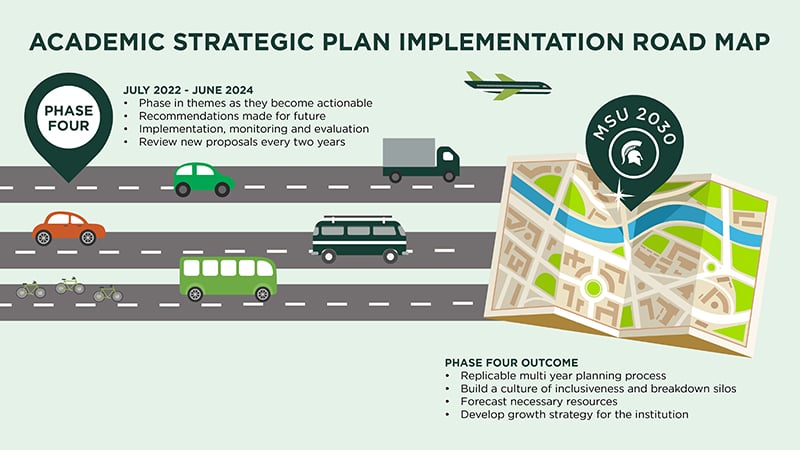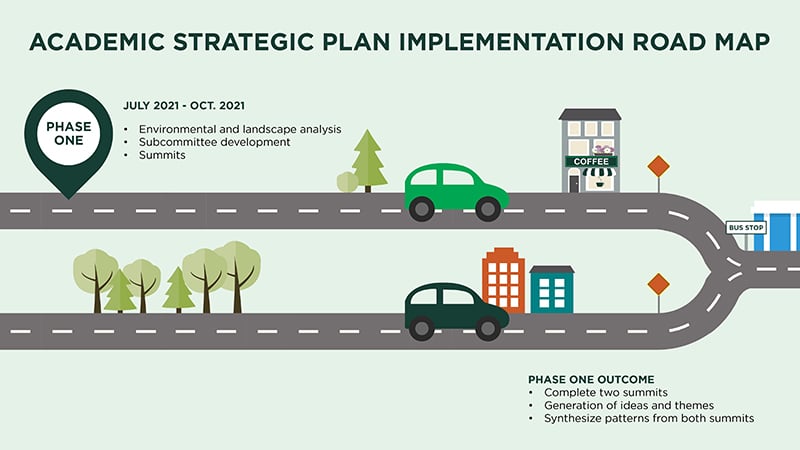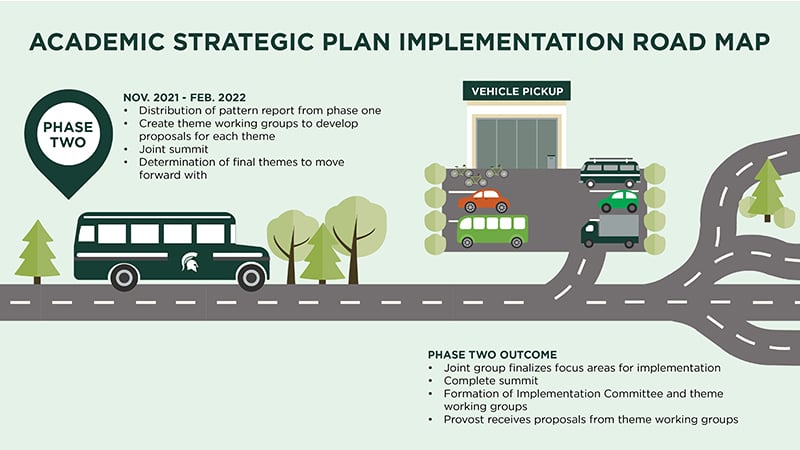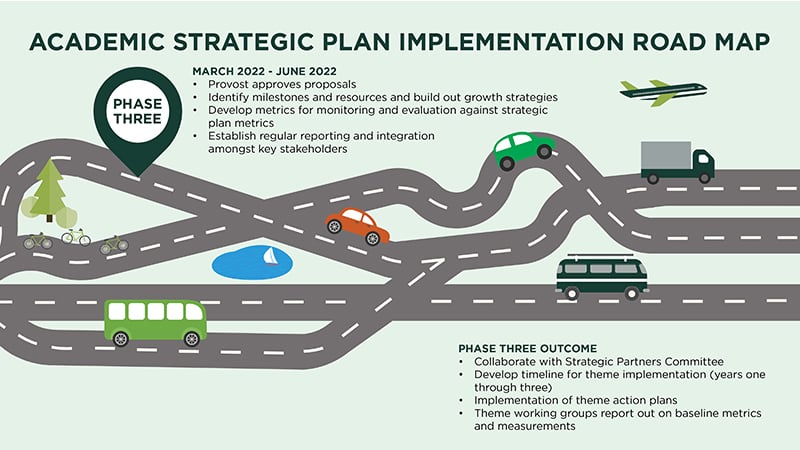Process & Timelines
What we’ve done and where we’re going:
Phase One
In fall 2021, we focused on Phase One of our academic strategic planning roadmap. The Office of the Provost intends to solicit input and facilitate collaboration across the entirety of the office’s purview, which includes all colleges and units reporting to an assistant or vice provost and the faculty, academic staff and support staff within.
Accordingly, we conducted a summit with deans and another with assistant and vice provosts and assistant and associate deans. We also finished an environmental and landscape analysis. Subcommittees of the Academic Strategic Plan Implementation Team synthesized patterns from both summits into Interest Areas that align with the six core themes from the University’s Strategic Plan. Interest Areas were our first step in getting specific about the actions and initiatives we will take to implement the strategic plan.
Phase Two
During our virtual Idea summit, those in attendance prioritized the 162 ideas and interest areas submitted to our Idea Submission Survey by narrowing down, and combining similar ideas. We had 430 individuals register for this event. More than 300 attend our webinar and 230 participated in our working group activity. During the working group activity, commitments were made to transition the prioritized ideas into formal proposals that were submitted to the Office of the Provost on April 11.
You can review the prioritized list of ideas that came out of our Idea Summit by looking at our Interest Areas page. Only the ideas that were selected by the working groups to move toward a proposal (using the mandatory framework) are listed on our website. This did not preclude anyone from submitting a proposal. Those who wanted to submit were able to connect with the Strategic Planning Implementation Team to request updates or new ideas to be placed on the list.
Proposal were drafted using the mandatory three-page proposal template. Each proposal was drafted meeting one or more of the following criteria:
- Campus-wide
- High impact
- Foundational
- Inclusive of outreach, engagement, and extension efforts
- In pursuit of bold new opportunities
- A revamp of existing projects/processes
- Inclusive of multiple units, colleges or departments
Proposals were due on April 11, 2022. On April 14, the Office of the Provost hosted a virtual Proposal Summit. During this time, anyone who submitted a proposal had the opportunity to present a five-minute presentation to the campus community on their proposal. The focus for the day was on the big ideas being discussed. Those in attendance were asked to keep an open mind and listen only. We did not ask the community to engage with presenters with questions or comments. This event provided us an opportunity to value and elevate the work of contributors and projects leads, amplifying proposal ideas by sharing with the broader Provost Office community.
Phase Three
The provost reviewed the submitted proposals and selected initiatives that would advance as part of the academic strategic planning implementation efforts. These ideas not only impact our local MSU community, it also aligns with MSU’s core values and strategic priorities as we look to the future.
It is exciting to note there was significant crossover among proposal ideas which will require additional efforts to determine integration points. Therefore, the Academic Strategic Planning Team held kick-off meetings in the spring of 2023 to facilitate conversations regarding the synergies in the advancing proposals within the Student Success and Staff and Faculty Success pillars of the University Strategic Plan. These kick-off meetings included rich conversations to advocate for the entire campus to move in one direction around strategic initiatives. Refining ideas requires synthesis of these efforts in order for the Office of the Provost to leverage all initiatives and resources to reach the MSU 2030 Strategic Plan goals for Staff and Faculty Success and Student Success. To accomplish this advancing proposals with synergies were provided an outline for refining proposals that will be reviewed by the University Strategic Planning Executive Sponsors. These refined proposals are being accepted on a rolling submission cycle. Please keep in mind that budget requests for refined proposals should consider the overall university budget planning process. The Academic Strategic Planning Implementation team provided information and support for collaborative integration, budget requests, implementation timelines, and outline for implementation proposal and project summary. This team is also available to answer questions and provide guidance as requested at Academicstrategicplanning@msu.edu.
Phase Four
Synergies among advancing proposals will be organized into refined proposals, using an outline that describes the refined proposal initiative, the people involved, the budget forecast, a management plan and timeline, and measurements of success. These will be reviewed by the University Strategic Planning Executive Sponsors. The provost is one of the executive sponsors for Staff and Faculty Success pillar and the Student Success pillar of the University Strategic Plan.
Proposals using the refined proposal outline can be submitted on a rolling cycle going forward. New ideas can be submitted and considered by using the refined proposal outline.
Submissions should be sent to: Academicstrategicplanning@msu.edu.
Submissions that become academic strategic planning initiatives can be found in the priorities and initiatives section of the provost website.



